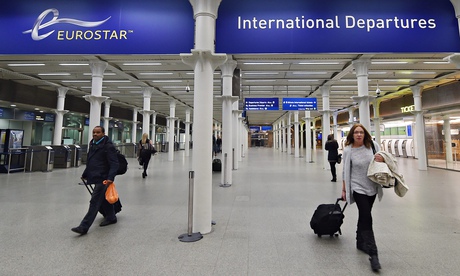
Britain and the United States have stepped up measures to counter the spread of Ebola as more people were isolated in Europe and Africa to monitor them for symptoms of the deadly virus.
An eight-hour exercise was being held in various locations across Britain on Saturday to test how the country would deal with a potential outbreak of the virus, which has killed more than 4,000 people worldwide.
Actors have been used to simulate patients with symptoms of Ebola to test the response of emergency services, government ministers and health chiefs. The Department of Health has not disclosed where the exercises are taking place.
Meanwhile, US authorities are introducing new border checks at airports in the wake of the death of Thomas Eric Duncan, the first patient to be diagnosed with Ebola outside Africa. Duncan had travelled to the US from Liberia, and was only diagnosed with the disease once he arrived in Dallas.
New York’s JFK airport is to start enhanced screening passengers from the west African countries worst affected by Ebola, and checks will begin in the next few days at another four: O’Hare in Chicago, Newark, Washington’s Dulles and Atlanta’s airport.
The move comes amid criticism of the failure to admit Duncan when he first went to the hospital in Texas and told staff of his recent arrival from Liberia, delaying his treatment by at least two crucial days and potentially exposing others to the virus. It took almost a week to clean the apartment where he stayed and health officials briefly lost track of a homeless man whom they were monitoring for Ebola symptoms.
But Dr Michael Osterholm, an expert on infectious disease at the University of Minnesota, warned there was yet no detailed national plan or protocol for Ebola. “Some states are much, much better prepared from a public health perspective to handle [an outbreak] than others,” he said.
The UK government said on Friday that passengers arriving at Heathrow and Gatwick airports and the Eurostar rail terminal would also face screening, but the effectiveness of the move has been questioned by health experts.
Meanwhile, three more people are being monitored in a Madrid hospital for signs of Ebola, bringing to total number of those under observation in Spain to 16.
Teresa Romero, a nurse who contracted the virus after caring for two infected priests repatriated to Spain, remains seriously ill in hospital. She is so far the only person who has tested positive for Ebola through a transmission in Spain. But the case has raised concerns about contagion in Europe, and particularly Spain’s emergency planning to contain the spread of the often fatal virus.
Romero’s condition remains serious but improved overnight, a hospital source said on Saturday: “She is conscious and talks from time to time when she is in a good mood.”
Three more people who came into contact with Romero – a hairdresser, another nurse and a cleaner – were admitted to the isolation unit at the Carlos III hospital on Friday night. None of the 16 now being monitored, including Romero’s husband, have shown Ebola symptoms.
The United Nations peacekeeping mission in Liberia said that 41 staff members, including 20 military personnel, were under “close medical observation” after an international member of its medical team contracted Ebola. The measures were described as precautionary as none of the staff members had shown signs of the virus.
Liberia has recorded 2,316 confirmed, suspected and probable Ebola deaths – by far the highest of any country affected by the current outbreak, according to the latest World Health Organisation figures released on Friday.
Brazil’s health ministry said on Saturday that a man under observation for signs of the virus tested negative for the disease.
The 47-year-old man arrived in Brazil on 19 September from Guinea. The health ministry said he remained in quarantine in Rio de Janeiro and would only receive a clean bill of health following a second exam scheduled to take place on Sunday.
